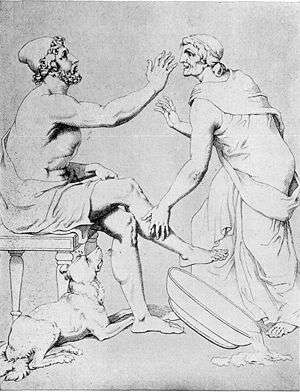Eurycleia of Ithaca
In Greek mythology, Eurycleia (Ancient Greek: Εὐρύκλεια Eurýkleia), or Euryclea (/ˌjʊərɪˈkliːə/; also known as Antiphata (Ἀντιφάτη Antipháte) in other traditions), is the daughter of Ops and granddaughter of Peisenor, as well as the wet-nurse of Odysseus.

Mythology
As a girl, Eurycleia was bought by Laertes, Odysseus' father. He treated her as his wife, but she was never his consummated lover so as not to dishonor his real wife, Anticleia. She later nursed Telemachus, Odysseus' son.
Eurycleia's name means "broad fame," while Anticleia means "anti-fame." The tension between the meanings of Eurycleia's name and Anticleia's name reflected the tension between the two pillars of Odysseus' life. He was born to Anticleia, a noble woman, but was nursed (and essentially raised) by Eurycleia, a lower-class maid. Odysseus' fame came from his role as a noble hero paralleled to his role as an anonymous beggar. His heroism was essential for capturing Troy; his skills as an orator and schemer as well as his strength and skills on the battlefield were instrumental in the success of the Greeks. However, he took on the role of a beggar not once, but twice. Odysseus' first appeared as a beggar to sneak into Troy and kill unsuspecting Trojan soldiers, and again when he returned home to Ithaca and planned to kill all of Penelope's suitors. In many ways, his role as a beggar, especially when he returned to Ithaca is far more meaningful. His re-entry into his own home after twenty years was arguably the most important moment of his life, perhaps suggesting that his role as a beggar — and his connection with Eurycleia — is what is most important to him.
Eurycleia was the only person to recognize him without him first revealing himself (as he did to Telemachus) after he returned home from the Trojan War. After he entered his own house as a guest of Penelope disguised as a beggar, Eurycleia bathed him and recognized him by a scar just above his knee, which he got from a boar while hunting with his grandfather Autolycus.[1]
Odysseus stopped her from telling Penelope or anyone else (except Telemachus, who already knows) in the house of his true identity: Gripping her by the throat he saids, "Nanny, d'ye want to destroy me?...not another soul must know. Or...I will not spare even you my nurse, when I kill the other women in this house." [2]
Eurycleia also informed Odysseus which of his servant girls had been unfaithful to Penelope during his absence, conspiring with Penelope's suitors and becoming their lovers. Among them was Melantho. His son Telemachus hanged the twelve that Eurycleia identified.
Later, Eurycleia informed Penelope that Odysseus has returned, but Penelope does not believe the maid. The queen then tested Odysseus to prove that he was indeed her husband and asked him to move the bed Odysseus built in their marriage-chamber; Odysseus told Penelope that it was not possible, as one of the legs of the bed was built into a live olive tree, a secret that only Penelope and Odysseus would know. She finally accepted that her husband has returned.
In addition, it was Eurycleia who gave provisions and supplies to Telemachus from the storehouse before he left for Pylos to seek news about Odysseus. She took an oath not to tell Penelope he had left until 12 days had passed; Telemachus not wanting his mother to be any more worried than she already was.
See also
References
- The Odyssey, Book 19
- The Odyssey, as translated by W.H.D. Rouse, published by Mentor Books, 1955)
Sources
- Homer. The Odyssey. Trans. Stanley Lombardo. Canada: Hackett Publishing Company, Inc., 2000. Print.
External links

- The Homeric Epics and the Gospel of Mark, Bryn Mawr Classical Review